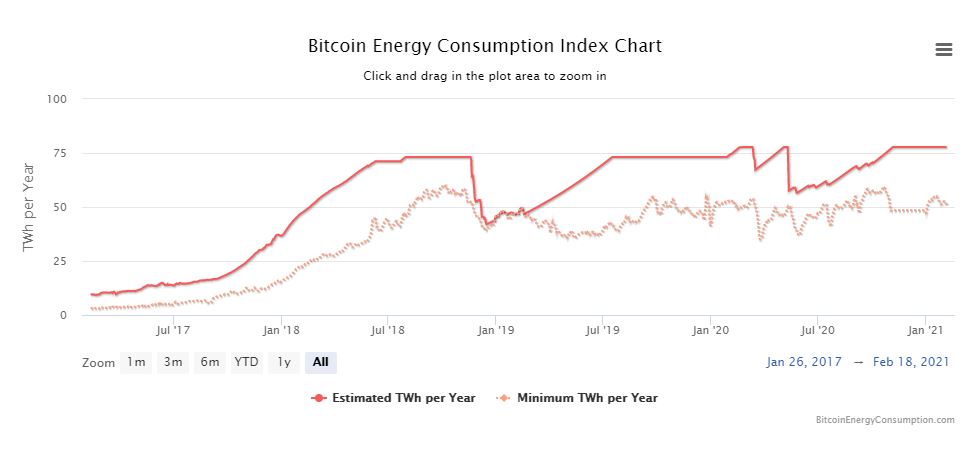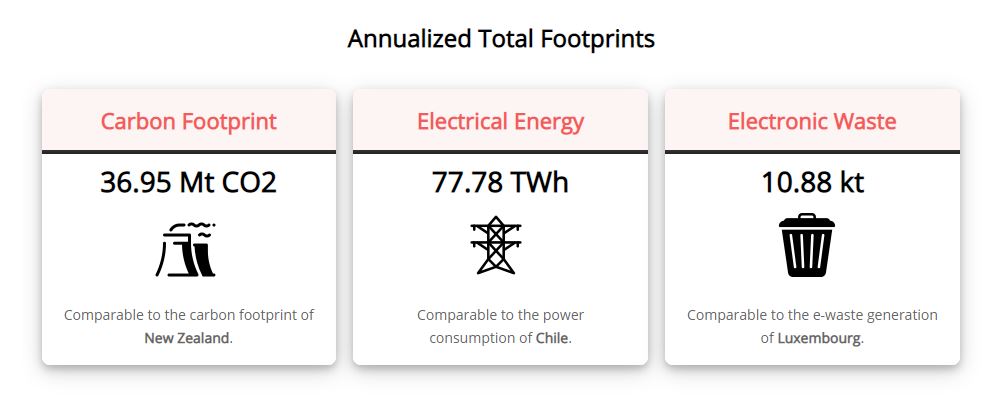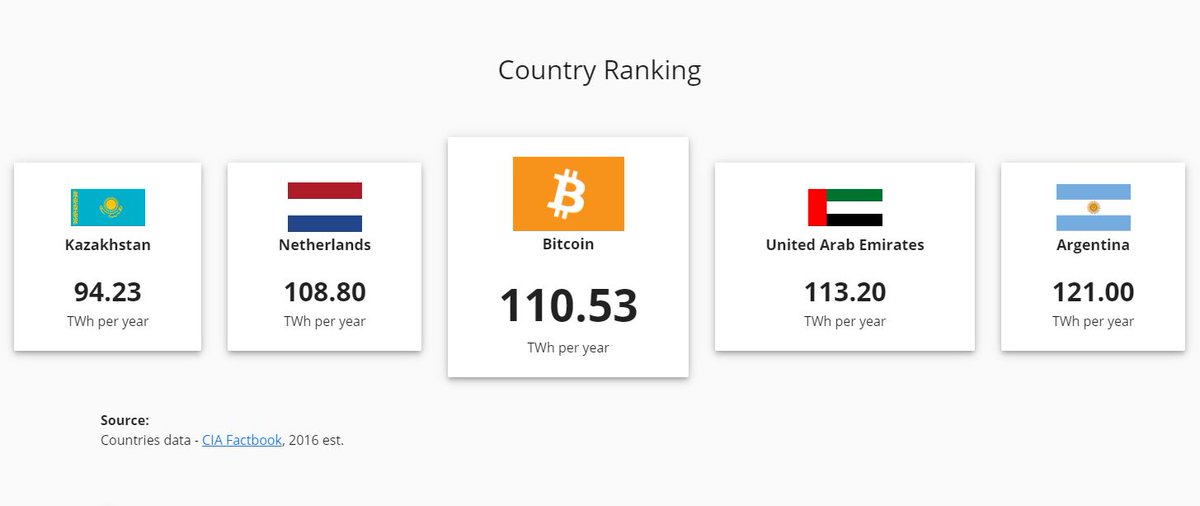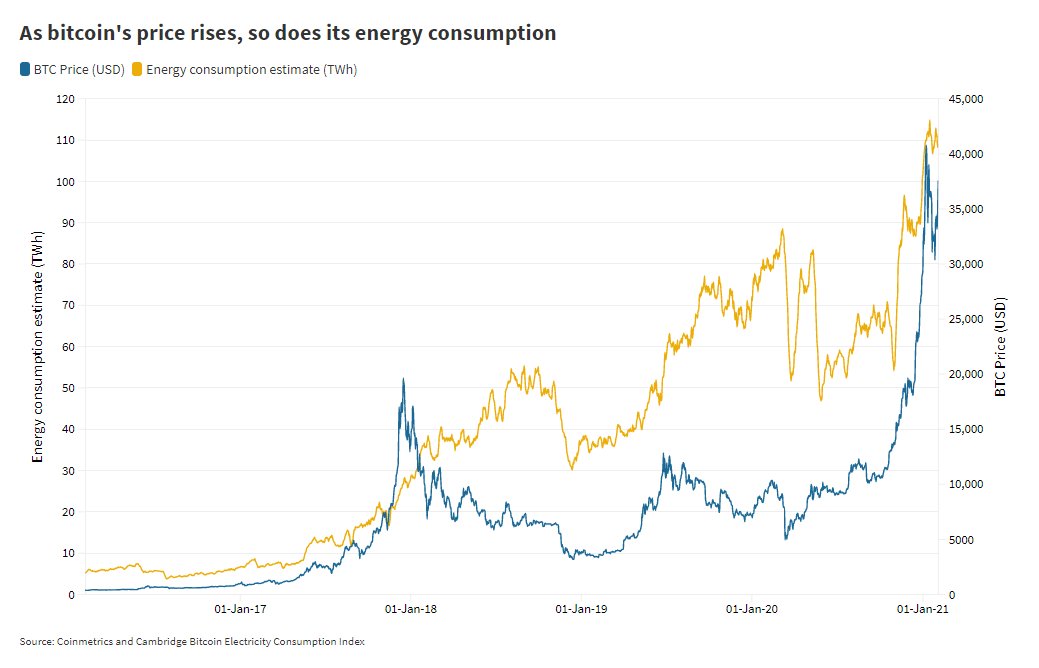Let’s talk about bitcoin’s impact on the environment  https://www.cnbc.com/2021/02/05/bitcoin-btc-surge-renews-worries-about-its-massive-carbon-footprint.html
https://www.cnbc.com/2021/02/05/bitcoin-btc-surge-renews-worries-about-its-massive-carbon-footprint.html
 https://www.cnbc.com/2021/02/05/bitcoin-btc-surge-renews-worries-about-its-massive-carbon-footprint.html
https://www.cnbc.com/2021/02/05/bitcoin-btc-surge-renews-worries-about-its-massive-carbon-footprint.html
The #bitcoin  network has for years alarmed experts due to the sheer level of electricity it uses.
network has for years alarmed experts due to the sheer level of electricity it uses.
TL;DR - crypto miners run power-hungry computers that compete to solve complex math problems to verify transactions. https://www.cnbc.com/2021/02/05/bitcoin-btc-surge-renews-worries-about-its-massive-carbon-footprint.html
 network has for years alarmed experts due to the sheer level of electricity it uses.
network has for years alarmed experts due to the sheer level of electricity it uses.TL;DR - crypto miners run power-hungry computers that compete to solve complex math problems to verify transactions. https://www.cnbc.com/2021/02/05/bitcoin-btc-surge-renews-worries-about-its-massive-carbon-footprint.html
This process is the *only way* new bitcoins can be released into circulation.
The total supply of BTC is capped at 21 million. It’s estimated that the last coin won’t be mined until the year 2140. https://www.cnbc.com/2021/02/05/bitcoin-btc-surge-renews-worries-about-its-massive-carbon-footprint.html
The total supply of BTC is capped at 21 million. It’s estimated that the last coin won’t be mined until the year 2140. https://www.cnbc.com/2021/02/05/bitcoin-btc-surge-renews-worries-about-its-massive-carbon-footprint.html
Now let’s look at how much energy bitcoin consumes. @DigiEconomist estimates it’s about 77.78 TWh on an annual basis. That’s comparable to the annual power consumption of Chile... https://digiconomist.net/bitcoin-energy-consumption
Per @CambridgeAltFin, it’s even higher: 110.53 TWh. For comparison, that’s more than the entire annual energy consumption of the Netherlands! https://cbeci.org/
Experts I spoke with, including @IOHK_Charles and @mrauchs, say bitcoin’s price is a key driver of energy consumption (the higher the price, the more potential revenue for miners, meaning more competition, more machines and therefore more power required). https://www.cnbc.com/2021/02/05/bitcoin-btc-surge-renews-worries-about-its-massive-carbon-footprint.html
Here’s a chart comparing the price of bitcoin (USD) vs annual energy consumption estimate (TWh): https://www.cnbc.com/2021/02/05/bitcoin-btc-surge-renews-worries-about-its-massive-carbon-footprint.html
A more important figure ofc would be bitcoin’s carbon footprint. Per Digiconomist, BTC is comparable to New Zealand (!) when it comes to CO2 emissions, producing nearly *37 megatons* annually. https://www.cnbc.com/2021/02/05/bitcoin-btc-surge-renews-worries-about-its-massive-carbon-footprint.html
What’s the alternative? Some folks in crypto, like @IOHK_Charles, believe it’s alternatives to bitcoin. https://www.cnbc.com/2021/02/05/bitcoin-btc-surge-renews-worries-about-its-massive-carbon-footprint.html
Hoskinson’s firm developed a token called cardano, which is based on a different consensus protocol to bitcoin (proof of stake). Other PoW tokens include polkadot & algorand. https://www.cnbc.com/2021/02/05/bitcoin-btc-surge-renews-worries-about-its-massive-carbon-footprint.html
Proof of stake essentially = you buy tokens to participate in the network. It’s different to “proof of work” (bitcoin’s protocol) which relies on the aforementioned mining process. https://www.cnbc.com/2021/02/05/bitcoin-btc-surge-renews-worries-about-its-massive-carbon-footprint.html
So what’s the defence from believers in bitcoin? @Melt_Dem tells me this talk about BTC’s energy consumption misses the point. People are “trying to decide what is or is not a good use of energy,” she says. https://www.cnbc.com/2021/02/05/bitcoin-btc-surge-renews-worries-about-its-massive-carbon-footprint.html
Demirors says bitcoin miners are “incentivized” to use renewable energy, as cost is falling.
Worth noting here though that most bitcoin mining facilities are located in China, which is still heavily reliant on coal... https://www.cnbc.com/2021/02/05/bitcoin-btc-surge-renews-worries-about-its-massive-carbon-footprint.html
Worth noting here though that most bitcoin mining facilities are located in China, which is still heavily reliant on coal... https://www.cnbc.com/2021/02/05/bitcoin-btc-surge-renews-worries-about-its-massive-carbon-footprint.html
Demirors also questions why banks aren’t under more scrutiny about their energy usage, adding the industry lacks transparency when it comes to environmental impact. https://www.cnbc.com/2021/02/05/bitcoin-btc-surge-renews-worries-about-its-massive-carbon-footprint.html
Ofc, how bitcoin is used *is* important in this discussion. Today it’s widely considered an investment (some may say “digital gold”). https://www.cnbc.com/2021/02/05/bitcoin-btc-surge-renews-worries-about-its-massive-carbon-footprint.html
An efficient payment system? Not so much...
According to @DigiEconomist, the energy footprint of one bitcoin transaction is equivalent to *100,000* payments on Visa. https://www.cnbc.com/2021/02/05/bitcoin-btc-surge-renews-worries-about-its-massive-carbon-footprint.html
According to @DigiEconomist, the energy footprint of one bitcoin transaction is equivalent to *100,000* payments on Visa. https://www.cnbc.com/2021/02/05/bitcoin-btc-surge-renews-worries-about-its-massive-carbon-footprint.html
Can things get better?
Andrew Hatton, of @GreenpeaceUK, tells me the bigger issue is that “we’re largely powering 21st-century technology with 19th-century energy sources.”
For that to change, the way the internet as a whole is powered needs to change. https://www.cnbc.com/2021/02/05/bitcoin-btc-surge-renews-worries-about-its-massive-carbon-footprint.html
Andrew Hatton, of @GreenpeaceUK, tells me the bigger issue is that “we’re largely powering 21st-century technology with 19th-century energy sources.”
For that to change, the way the internet as a whole is powered needs to change. https://www.cnbc.com/2021/02/05/bitcoin-btc-surge-renews-worries-about-its-massive-carbon-footprint.html

 Read on Twitter
Read on Twitter





